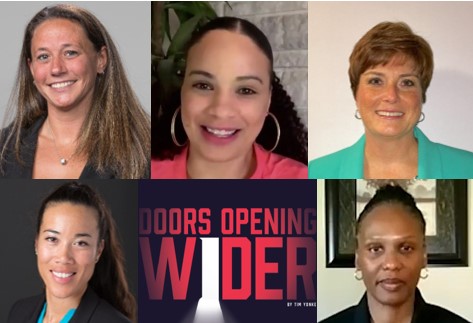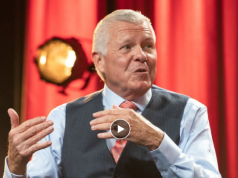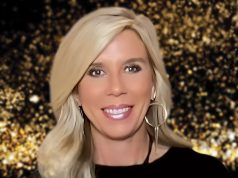Clockwise from top left: Amanda Bender, Maia Chaka, Kelly Dine, Sara Woods, Kaili Kimura
By Tim Yonke
In what could be a blueprint for women seeking to become officials and climb up the ranks of their chosen sport or sports, five prominent female officials were featured as a panel on the topic “Doors Opening Wider: Women in Officiating” – as part of the 2021 NASO Sports Officiating Summit @ Home.
The panel consisted of Amanda Bender, Missouri Valley Conference college football official as well as Division II basketball referee; Maia Chaka, the third female hired by the NFL as an on-field official; Kelly Dine, NCAA Division I baseball umpire; Kaili Kimura, NCAA Division I women’s basketball and volleyball official; and Sara Woods, college and semi-pro basketball referee. The conversation was moderated by NASO board member Dana Pappas.
Listening to these impressive women it quickly became clear that while their paths are varied, their resolve to make it to the heights of officiating in what has been predominately a male profession are uniform.
The session panelists were candid with stories about the unique experiences they faced on their climb.
The Road Less Traveled
In getting to the NFL, Chaka had to clear many hurdles.
“Obviously, my path has been very difficult because I’m the only one that looks like me,” remarked Chaka, the first black woman on-field official in the league.
She began working high school games and credits her crew with constantly pushing her to work up to the next level. After her first year of working high school football they started teaching her college rules and college mechanics.
To get to the NFL, Chaka said she received that final boost from some constructive criticism.
“I would say the most pivotal moment I believe was in 2017. I was already in the NFL program for about four seasons and it felt like I hit a plateau. I wasn’t getting the feedback I needed to grow,” she said.
“I was walking off the field of one my preseason games, and I was working with Chuck Steward who was our replay official that game. He walked off and told me, ‘You’re so close, but you have so much work to do.’ And he says if you trust me, and you just listen to everything I’m going to tell you, I promise you that I’ll help you try to reach your goal of getting to the National Football League.”
Steward told her she needed to find a Power Five Conference to work and that meant leaving her Virginia Beach, Va., home and heading west.
“So, my opportunity came by following the tutelage of Chuck and just following him blindly.”
As a college umpire, Dine’s unique path began out of necessity.
“I started officiating because I was coaching baseball. My boys were really into baseball initially when they were young. So I became their head coach, and I coached for more than 10 years,” she said.
“As the two older ones were moving into age groups we started to hear some whispers from the other side about the mom that was coaching. I was thinking about other ways that I could stay in the sport if I left coaching, and umpiring just seemed to be it.
“So we were walking home from a baseball practice one day, and there was a Little League field next to us where the two teams were ready to play and there was no umpire. And I told my son ‘tell Dad I’ll be home later.’ And I went over there and picked up an old mask and a balloon protector and put it on, and the bug bit. I’ve been an umpire ever since.”
Life Balance
Being a wife, mother and a sports official can be a real balancing act.
“It really takes a lot of planning and understanding how to balance your work and your life, your personal life. It impacts so many more people than just you,” remarked Woods.
“I think it’s important to have goals and objectives. Have a blueprint. Understand how to navigate your way through the system. It’s not as intuitive as we all think it is, you just go and you get a whistle and you get out there on the court or the field.
“It’s how to look the part, it’s how to navigate your career, how to communicate with people. There’s a lot more to it off the court and off the field than just what you do between those lines. So I think it’s very important to just have a plan in place and just chip away at it.”
In addition to being an NCAA Division I baseball umpire, Dine’s also a registered nurse, biomedical science teacher and a former lieutenant commander in the U.S. Navy. She provides an unusual perspective.
“For me it’s a blessing to have a life partner, my husband, who supports me 100 percent in what I do and sees me as an equal and wants to support my endeavors exactly like I want to support his endeavors,” she noted.
“In a large family like we have, communication is key. It’s being able to sit down and talk about who was traveling where, who was taxi driver for that weekend, sitting down with my sons and talking to them about some of my desires and some of my goals. Initially I did feel a little bit guilty as well. I thought, ‘You know, I’m a mom, I’m a wife, and how can I be out there for myself?’
“We all need to have that enjoyment for ourselves in order to be able to turn around and give it to others. And so being able to show my sons that the baseball field is not only a place of joy for me, it’s my therapy time, and it’s my away time. That I think is healthy in showing your children that they need that in their life, too, and that’s part of that balance.”
While she isn’t married, Bender said trying to maintain a full-time job, officiating and life in general can be a struggle.
“Everybody’s got different things that they need to balance,” said Bender. “I don’t think I’ve actually found that balance yet, but I do strive to do a better job.
“I have to tell myself not to feel guilty if I spend the night and go have dinner with my mom and I’m not in the rule book. And I have to remind myself not to feel guilty that I took a night off from thinking or studying or talking about whatever sport that may be.”
Where to Turn for Support?
The panel agreed that succeeding in a male-dominated field is challenging but it’s made easier with a support system.
“I really turned to my mentors, the people that brought me up in this,” said Kimura, who was an outstanding collegiate volleyball player. “When times were getting tough, or I just needed a pick-me-up, they would be the ones that would inspire me to go a little further.”
For Woods, she found inspiration from the success of a colleague, veteran basketball official Lisa Jones.
“I had just finished my first year and I was frustrated. I didn’t really have a lot of mentors. Really wasn’t sure the direction to go in,” remarked Woods, who recruits, develops and mentors perspective and current officials through her Big Game Officials program.
“I went to watch the NCAA tournament in St. Louis and when (Lisa Jones) stepped out on the court I was like ‘Wow.’ You know, her comportment, everything about her was just jaw dropping. And my husband said, ‘You know what, you could do that.’”
In almost any profession a person often needs a little help on his or her way to the top.
Dine found her support attending as many umpiring camps as she could.
“I got in my first college camp, and Scott Taylor who is the Division II NCAA coordinator of umpires at the time came up to me at that camp, and he said you have the potential to be a college umpire, stick with it. All it took was just hearing that,” Dine said.
“And, man, I just started working harder and harder, attending camps and clinics and games and here I am. It’s nice to have those people that recognize that it doesn’t matter what gender or what color you are you can succeed.”
For Bender, it’s all been about friends.
“I’m lucky that I have a great fan base of friends that can help. And that’s the one thing that I really love about officiating is the friends that I’ve met and people that I would have never met,” Bender remarked. “They’ve been through the same thing so they understand. And it’s nice that these people become your family because they do. It’s a great family, a great network.”
Words of Advice
When it came to scaling the officiating ladder, the panelists had some salient tips.
“Officiating is a very political game and especially when you’re trying to climb that ladder and you want to reach your goals. That was something that I had to learn,” noted Chaka, whose climb to the NFL began back in 2007.
“When you become a student of the game and you actually really start to apply rules and philosophies, and you watch other officials work and you compliment other officials and you pick up good things that other officials are doing and you start to work them into your repertoire, you really start to understand what it means to be successful and how to grow,” she noted.
“That should be your driving force. (You need) to engage and to ask questions with the higher ups and people that you’re going to these camps and clinics with. That’s how you build genuine relationships because they see your interest in the game.”
Added Kimura, “And being patient in the journey is huge. Like understanding that there are a lot of things we can’t control, but doing our best to go strong with the things that you can control.”
Attaining knowledge of your sport is a vital key.
“I think the more you know the rules the more comfortable you feel on the court, on the field,” suggested Bender. “Going to camps, going to clinics, and taking in as much knowledge as you can is important. It’s going to get easier. It just takes time.
“Remember that some people move faster than others, and I think it’s just as much work and time as you put in will move you up quicker one way or the other.”
As the athletic manager for the city of South Bend, Ind., Parks and Recreation Department, Bender is utilizing this role to start a basketball referee class.
“My goal is to help close the gap on shortage of officials, strongly recruiting females and hoping to be that mentor for them,” she said.
Because the journey often features highs and lows, Dine said, “Don’t ever give up on yourself even when others may give up on you.”
The 2019 Little League World Series home plate umpire and crew chief added, “Failure is simply in teaching terms not trying. Take that idea of failure and erase it from your mind. Because if you stumble all it is is a learning experience. That’s going to help you get better. Just keep pushing.”
Tim Yonke, of North Aurora, Ill., is a freelance writer and award-winning journalist.
Note: This article is archival in nature. Rules, interpretations, mechanics, philosophies and other information may or may not be correct for the current year.
This article is the copyright of ©Referee Enterprises, Inc., and may not be republished in whole or in part online, in print or in any capacity without expressed written permission from Referee. The article is made available for educational use by individuals.



















